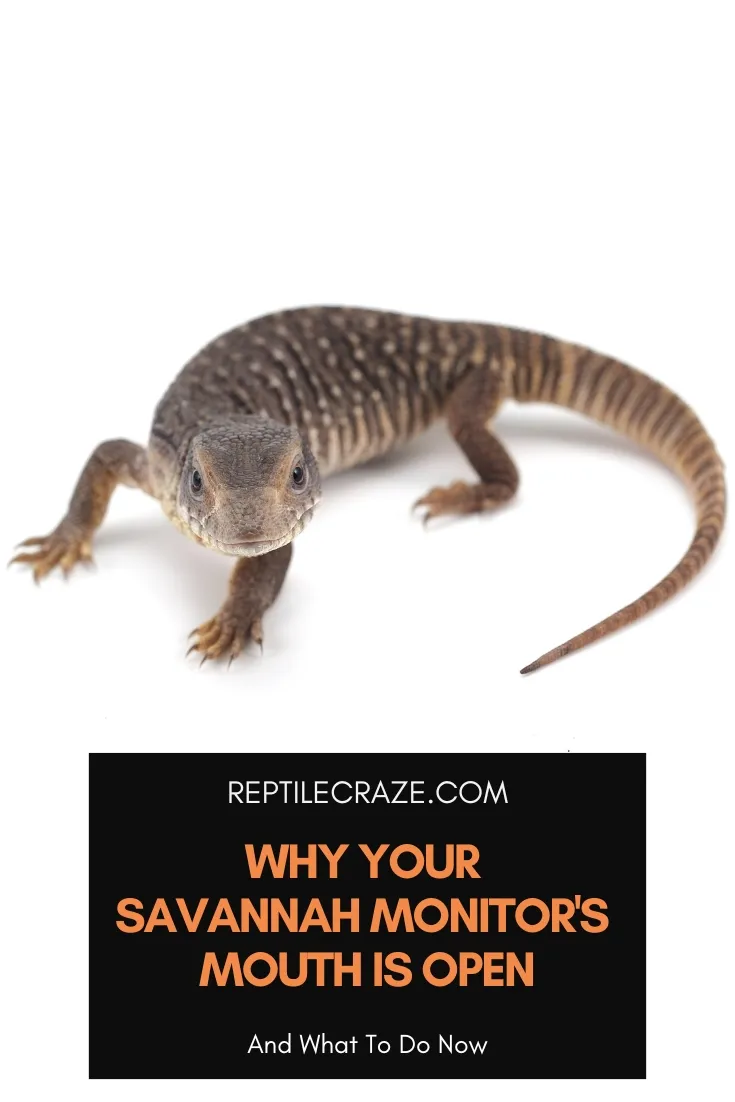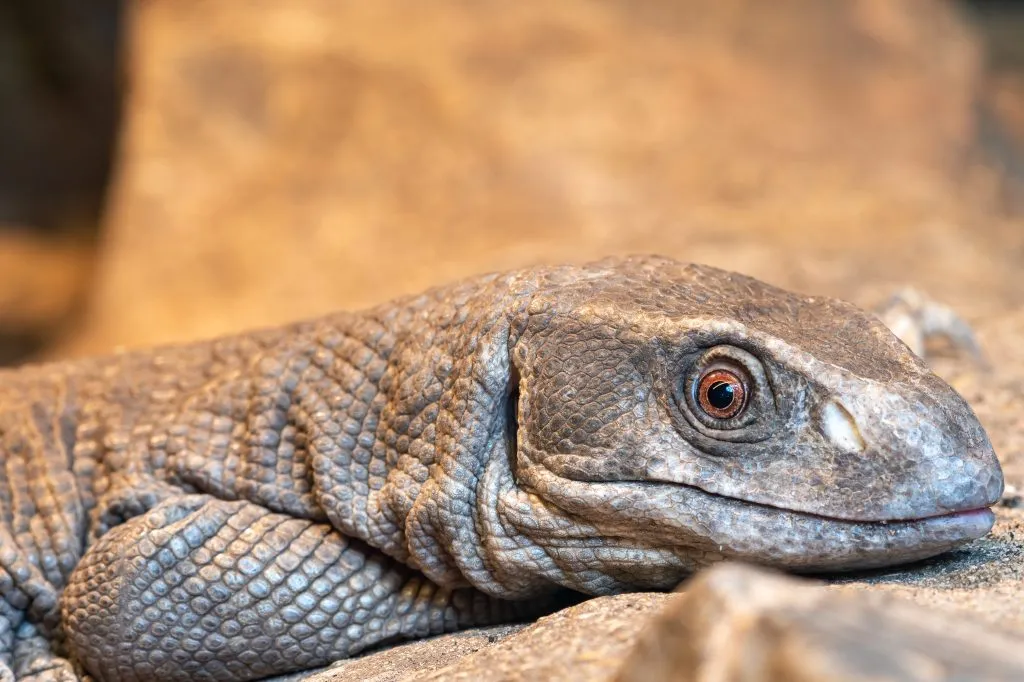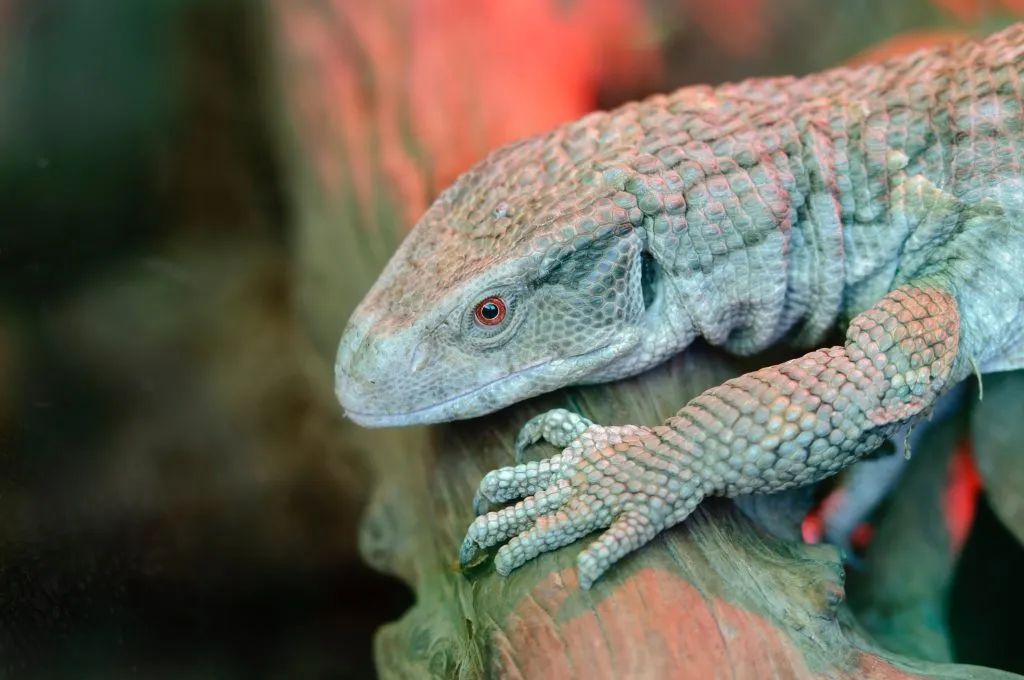
Savannah monitors are intelligent and mild-mannered reptiles that form a trusting relationship between owner and pet, so it can be very nerve-wracking when your Savannah monitor starts behaving differently. If you have noticed that your Savannah monitor is leaving its mouth open, there are some different reasons for it.
The most common reason why savannah monitors open their mouths is thermoregulation. By keeping the mouth open, they are able to cool down their body temperature. However, an open mouth can also be caused by stress and injuries or diseases.
In this article, we will discuss three reasons why your Savannah Monitor’s mouth is open and what to do about it.
Why Your Savannah Monitor’s Mouth is Open
Savannah monitors are typically docile and well-mannered and do not often open their mouths.
Here are three possible reasons why your Savannah monitor’s mouth is open.
1. Your Savannah Monitor is Sick

If you have noticed that your Savannah monitor keeps its mouth open for long periods, this could be a sign that it is sick with a respiratory illness. Heavy open-mouth breathing is one of the first signs of this illness.
Accompanied with open mouth breathing, you will also hear that your Savannah monitor is gasping or wheezing.
Other symptoms you should watch out for:
- Decreased appetite
- Swollen body
- Raised head to assist with breathing
- The appearance of stringy mucus in the mouth
- Listlessness
A respiratory infection is caused by two things, environmental factors or a parasite.
If your Savannah monitor’s enclosure is too cold, this can result in respiratory infections. You need to make sure that you are keeping your enclosure warm.
Aim for 90 and 100 degrees Fahrenheit during the day to imitate the warm climate of Central Africa without any drafts.
Dirty enclosures are perfect breeding grounds for parasites that can cause respiratory infections. Make sure you are cleaning your monitor’s enclosure properly.
In addition to making changes to the Savannah monitor’s environment, you must take your monitor to a reptile vet for evaluation.
Your vet will most likely prescribe antibiotics and fluid replacement if your monitor is dehydrated. During this time, watch your monitor closely to ensure their conditions do not worsen.
2. Thermal Regulation

Savannah monitors are cold-blooded reptiles and come from the hot and sunny climate of Central Africa, so they need to be kept in a warm enclosure.
However, this doesn’t mean that they like to be overheated. When Savannah monitors become too warm, they need to regulate their thermal temperatures. They do this by opening their mouths and taking long breaths.
So, if you see your Savannah monitor taking slow, steady breaths with an open mouth, they simply allow dry air into their airways, where it evaporates and, in turn, cools down the body’s temperature.
Making sure that the temperatures are consistent in the enclosure is a good way of preventing your monitor from overheating.
Dehydrated Savannah monitors have a tougher time trying to cool themselves down, so be sure to keep the humidity levels at 60%.
You should also have a cool zone in the enclosure in the enclosure so they can escape the heat.
A great way of preventing overheating is by ensuring that the basking area of the enclosure does not exceed 130°F.
Not only can excessive heat and strong lights cause overheating, but they can cause burns.
3. Your Savannah Monitor is Stressed

Suppose you notice that your Savannah monitor is opening its mouth but is not displaying any signs of illness or overheating. In that case, this could be a behavioral sign of stress and is a type of threat display.
Other signs of behavioral stress in Savannah monitors:
- Hissing
- Standing on its back legs
- Tail-whipping
- Inflated neck
- Increased tongue flicking
While Savannah monitors are mild-mannered, baby monitors are also known to be pretty feisty and hiss a lot.
There can be times when your monitor is just simply not in a mood to be handled by you, and the opening of their mouth is a clear sign to back off before you get bit.
Common Causes of Stress in Your Savannah Monitor
Identifying the common causes of what is stressing your Savannah monitor out will help keep its mouth closed and happy.
Environment Stresses
A good example of environmental stresses is that enclosures that are too warm, cold, or too small can cause your monitor to feel stressed.
Social Stresses
Sometimes your monitor can become stressed if it is sharing an enclosure with other monitors. Savannah monitors are solitary creatures, so jamming them in an enclosure with other monitors is bound to create a stressful environment.
Monitors can become stressed very easily in unfamiliar environments. If you have moved the enclosure around or changed the interior, this might make your monitor feel stressed and uncomfortable.
Nutritional Stresses
Your monitor’s diet will play a role in the temperament, as poor nutrition can create added stress. You should ensure you feed your monitor a balanced and nutritious diet. This means invertebrates and small rodents.
Stress Caused By Handling

If your monitor is not happy with the way you are handling them, they will open their mouth wide as a threat display.
We recommend that you start practicing correct handling techniques when the monitor is still a baby so that they become accustomed to it.
However, just like we have bad days, your monitor might also have days when they don’t want to be handled. If this happens, don’t force it, or you may get bit.
Final Thoughts
For the most part, your Savannah monitor’s open mouth is usually caused by stresses that you can adjust, like heat, nutrition, and environmental/social stress, to prevent this, so keep an eye on these things.
If your monitor is displaying any symptoms of illness or you are still concerned, it is a good idea to take your Savannah monitor to the vet. They can provide a proper diagnosis and treatment.
- Eastern Rat Snake: Nature’s Pest Control and Fascinating Reptile - September 20, 2024
- Eastern Racer: The Fast and Agile Snake - September 19, 2024
- The Eastern Indigo Snake: The Majestic, Non-Venomous Hunter of the Southeast - September 18, 2024
